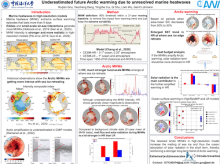Changed nature of polar warming in high-resolution climate models
Ruijian
Gou
Ocean University of China and Alfred Wegener Institute
Poster
The Arctic is warming faster than any other oceans, a phenomenon known as Arctic amplification that has far-reaching implications for global climate. In contrast, the Southern Ocean (SO) have cooled in recent decades. The projection of future polar warming exhibits non-negligible model spread. Here we show that under a strong future warming scenario, comparing the high-resolution climate models to low-resolution versions, the warming in the Arctic is generally greater and the SO shows less warming and even cooling trends . By a cutting-edge high-resolution climate model, we attribute the amplified Arctic warming to Arctic marine heatwaves (MHWs). The resolving of MHWs , which are at least twice as strong in the high-resolution model version, destabilize the ice-albedo feedback and amplify the Arctic warming. We attribute the less SO warming to strengthing marine cold spells (MCSs) and weakening of MHWs. We highlight that Arctic amplification is underestimated and SO warming is overestimated by the current generation of climate models, which generally have a low resolution that underestimates marine extremes.

gou-rujian-polar-poster.pdf
(854.31 KB)
